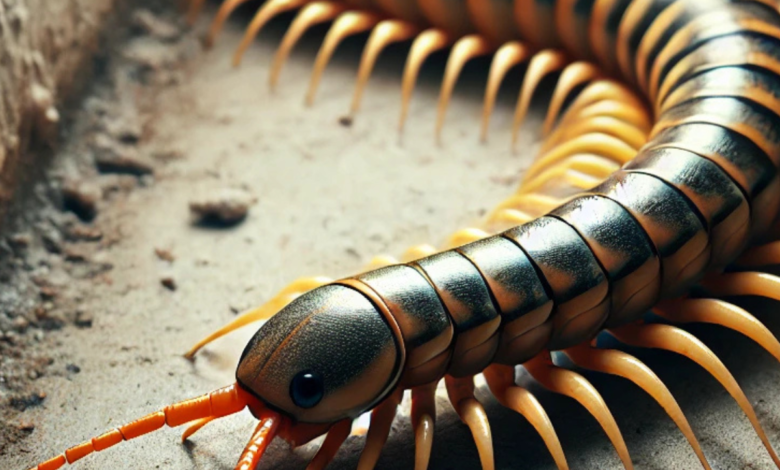House Centipede Bite: What You Need to Know?

House centipedes are common household pests found in many regions worldwide. Known for their long legs and fast movements, these insects may look frightening, but their bite is often harmless to humans. In this article, we’ll discuss everything you need to know about house centipedes, including their bite, potential risks, prevention methods, and how to handle a bite if one occurs.
What is a House Centipede?
A house centipede is a small, elongated arthropod known for its numerous legs and distinctive appearance. It typically has a yellow-gray color with dark stripes running down its body, and it can have up to 15 pairs of legs. These legs allow it to move quickly, often scurrying across walls and floors in search of prey.
- Scientific Name: Scutigera coleoptrata
- Common Name: House centipede
- Appearance: Long body with up to 15 pairs of legs, yellow-gray with dark stripes
- Habitat: Prefers damp areas like basements, bathrooms, and kitchens
Why Do House Centipedes Enter Homes?
House centipedes usually enter homes searching for food, shelter, and moisture. These centipedes prey on smaller insects like spiders, cockroaches, and ants, making them natural pest controllers. However, they prefer damp, dark environments and often find ideal conditions in basements, bathrooms, and kitchens.
Can House Centipedes Bite Humans?
Yes, house centipedes can bite humans, although it is rare. Most of the time, house centipedes are shy and avoid direct contact with people. However, they may bite in self-defense if they feel threatened or trapped.
What Does a House Centipede Bite Feel Like?
A house centipede bite is generally mild and not considered dangerous to humans. The bite usually feels like a small pinch or sting, accompanied by mild discomfort or irritation. In most cases, the bite does not penetrate deeply, as house centipedes do not have powerful jaws like other insects. Most bites result in:
- Mild pain or discomfort
- Redness or slight swelling at the bite site
- Minor itching or irritation
Potential Risks of a House Centipede Bite
While house centipede bites are generally harmless, some considerations should be made. Some people may experience mild allergic reactions or increased sensitivity to the bite.
Are House Centipede Bites Dangerous?
For most individuals, a house centipede bite is not dangerous. The venom house centipedes inject into their prey is potent for small insects but not strong enough to pose a serious risk to humans. However, small individuals may experience mild to moderate allergic reactions.
- Common Symptoms: Mild itching, redness, or slight swelling
- Rare Symptoms: Increased irritation, mild allergic reaction, prolonged redness
When to Seek Medical Help
In rare cases, medical attention may be necessary if a person experiences severe symptoms after a house centipede bite. Signs of a severe reaction include:
- Persistent swelling or redness
- Intense pain that does not subside
- Signs of infection (e.g., warmth, pus, or worsening pain)
- Difficulty breathing or other symptoms of an allergic reaction
While these symptoms are rare, they can occur and should be addressed promptly if they arise.
How to Treat a House Centipede Bite
In the event of a house centipede bite, there are simple steps you can take to manage symptoms at home. These steps will help reduce pain, swelling, and the chance of infection.
Steps to Treat a House Centipede Bite
- Clean the Bite Area: Wash the area with soap and warm water to remove any bacteria and reduce the risk of infection.
- Apply a Cold Compress: A cold compress or ice pack can help numb the area, reduce pain, and minimize swelling.
- Use an Over-the-counter Pain Reliever: If discomfort persists, consider using an over-the-counter pain reliever, like ibuprofen or acetaminophen.
- Apply Antihistamine Cream or Hydrocortisone: To address any itching or redness, apply a topical antihistamine cream or hydrocortisone ointment to the bite area.
Home Remedies for House Centipede Bites
Several home remedies can also help ease the symptoms of a house centipede bite:
- Aloe Vera: Known for its soothing properties, aloe vera gel can help reduce pain and redness.
- Baking Soda Paste: A paste made from baking soda and water can alleviate itching and irritation.
- Apple Cider Vinegar: Applying apple cider vinegar to the bite may provide relief due to its anti-inflammatory properties.
Preventing House Centipede Bites
Although house centipede bites are rare, there are ways to prevent them altogether. Taking a few precautions can minimize your chances of encountering these insects indoors.
Keeping Your Home Free of House Centipedes
Like other insects, house centipedes are attracted to moisture, darkness, and food sources. To reduce their presence in your home:
- Eliminate Moisture: Use dehumidifiers in damp areas like basements and bathrooms.
- Seal Cracks and Gaps: To prevent entry, close any cracks or gaps around doors, windows, and walls.
- Reduce Clutter: House centipedes prefer hiding spots, so reducing clutter can make your home less appealing.
- Regular Pest Control: House centipedes feed on more minor pests, so that regular pest control can reduce their food sources.
Tips for Preventing Bites
Avoid handling them directly to minimize the risk of a house centipede bite. Instead of squishing them, use a piece of paper or a container to trap and release them outdoors. This reduces the chance of them feeling threatened and biting.
Frequently Asked Questions About House Centipede Bites
Many people have questions about house centipedes and whether their bites cause concern. Below are some of the most common questions.
Do House Centipedes Bite Humans Often?
No, house centipedes rarely bite humans. They are more likely to flee than bite when they come into contact with people.
Are House Centipedes Dangerous to Pets?
House centipedes are not dangerous to pets. However, some pets, like cats and dogs, may try to catch and eat them. The centipede’s venom is mild and unlikely to harm pets, though it may cause minor irritation in the mouth or stomach if ingested.
Can a House Centipede Bite Cause an Infection?
In most cases, a house centipede bite does not lead to infection. However, bacteria may enter if the bite is not kept clean, leading to a minor infection. Always clean any bite thoroughly to minimize this risk.
How Long Do Symptoms of a House Centipede Bite Last?
Symptoms of a house centipede bite, such as mild pain or redness, usually last a few hours to a day. If symptoms persist beyond 24 hours or worsen, consult a healthcare professional.
Conclusion: House Centipede Bites – Mild but Manageable
In summary, while a house centipede bite may look and sound alarming, it is generally mild and not harmful to humans. These insects prefer to avoid humans and only bite in self-defense. Symptoms are usually minimal and manageable with primary first-aid care, including cleaning, cooling, and applying creams for any itching or discomfort.
By preventing house centipedes in your home, like reducing moisture and sealing cracks, you can further reduce the risk of a house centipede bite. Remember, these little creatures play a helpful role by controlling other pests in the household, so they are more beneficial than harmful.





